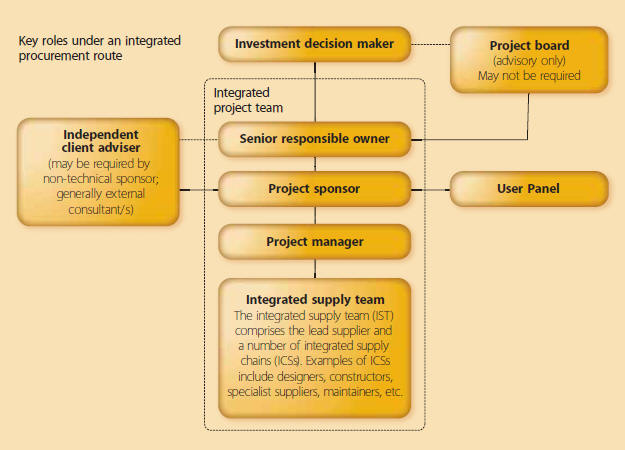Independent client adviser for building design and construction
The Government Construction Strategy proposes that publicly-funded projects should adopt either a design and build, private finance initiative (PFI) or prime contract procurement route, unless it can be demonstrated that an alternative route offers better value.
The government recommend appointing an integrated supply team to design and construct (and sometimes to finance, operate and maintain) the development. This appointment is expected to take place once the project brief has been prepared, i.e. before any design work has been undertaken. This means that the client is not required to appoint design consultants themselves. As a consequence, any expert advice they might require is provided by the appointment of independent client advisers.
The extent of advice required from independent client advisers will depend upon the in-house expertise available to the client. Some clients (such as the Ministry of Defence) may be very experienced and require little external advice, whilst others may be undertaking their first building project and could require considerable external input.
Professions that might offer services as independent client advisers could include:
- RIBA Client Adviser
- Surveyors.
- Cost consultants.
- Business management consultants.
- Lawyers.
- Project managers.
- Project monitors.
- Accountants.
- Land agents.
- Information and communications technology consultants.
- Media consultants.
- Planning consultants.
- Site inspectors (clerk of works).
Where several independent client advisers are appointed, it may be appropriate to make one of them 'lead consultant' with responsibility for co-ordinating the others and becoming the main liaison for the client. Alternatively, the client may wish to appoint their own project manager to perform this co-ordination role (although on public projects the independent client advisers may be appointed before the project manager).
Where the project sponsor is not a technical expert and such expertise is not available in-house, external advisers should be consulted at the earliest opportunity, before Gate 0 (OGC Gateway 0: Strategic assessment) ... Access to independent client advisers is especially useful before the appointment of the project manager.
ref Achieving Excellence Guide 2 - Project Organisation P6.
Independent client advisers might be required on public sector projects to help the client:
- Assess the business case for the proposed development.
- Develop the strategic brief and project brief for the project.
- Assess high-level options (such as; the potential to refurbish or re-structure rather than build a new building)
- Identify potential sites.
- Prepare an output-based specification.
- Select a procurement route.
- Identify and select the integrated supply team.
- Carry out design reviews.
- Monitor or inspect construction and testing.
- Carry out post project reviews (to evaluate the project delivery process).
- Assess performance in use.
OGC guidance shows the relationship between independent client advisers and other key roles as illustrated below:
Image reproduced courtesy of OGC ref Achieving Excellence Guide 2 - Project Organisation.
Independent client advisers can also be beneficial in the ealry stages of private sector projects, before the consultant team is appointed, providing advice on issues such as; assessing the potential to refurbish or re-structure rather than undertake a new building project, identifying potential sites, developing a business case, developing a strategic brief, identifying and selecting consultants and so on.
NB The Office of Government Commerce (OGC) has now been absorbed into the Efficiency and Reform Group (ERG) within the Cabinet Office. OGC guidance has been archived, however, it is cited in the Government Construction Strategy and the Common Minimum Standards, and links are provided to OGC documents from government websites such as the Major Projects Authority. The OGC gateway review process still provides one of the best and most comprehensive sets of guidance for public projects. It is for this reason that the project plan for public projects within Designing Buildings Wiki follows the OGC gateway review process.
[edit] Related articles on Designing Buildings Wiki
- BREEAM independent party.
- Appointing consultants.
- Client BIM adviser.
- Client design advisor.
- Consultant team.
- Crime Prevention Design Advisor.
- Government Construction Strategy.
- Independent principal consultant.
- Independent third party.
- Integrated project team.
- Integrated supply team.
- Procurement route.
- Project manager.
- Project monitoring.
- Public procurement.
- OGC.
[edit] External references
Featured articles and news
A case study and a warning to would-be developers
Creating four dwellings... after half a century of doing this job, why, oh why, is it so difficult?
Reform of the fire engineering profession
Fire Engineers Advisory Panel: Authoritative Statement, reactions and next steps.
Restoration and renewal of the Palace of Westminster
A complex project of cultural significance from full decant to EMI, opportunities and a potential a way forward.
Apprenticeships and the responsibility we share
Perspectives from the CIOB President as National Apprentice Week comes to a close.
The first line of defence against rain, wind and snow.
Building Safety recap January, 2026
What we missed at the end of last year, and at the start of this...
National Apprenticeship Week 2026, 9-15 Feb
Shining a light on the positive impacts for businesses, their apprentices and the wider economy alike.
Applications and benefits of acoustic flooring
From commercial to retail.
From solid to sprung and ribbed to raised.
Strengthening industry collaboration in Hong Kong
Hong Kong Institute of Construction and The Chartered Institute of Building sign Memorandum of Understanding.
A detailed description from the experts at Cornish Lime.
IHBC planning for growth with corporate plan development
Grow with the Institute by volunteering and CP25 consultation.
Connecting ambition and action for designers and specifiers.
Electrical skills gap deepens as apprenticeship starts fall despite surging demand says ECA.
Built environment bodies deepen joint action on EDI
B.E.Inclusive initiative agree next phase of joint equity, diversity and inclusion (EDI) action plan.
Recognising culture as key to sustainable economic growth
Creative UK Provocation paper: Culture as Growth Infrastructure.






















